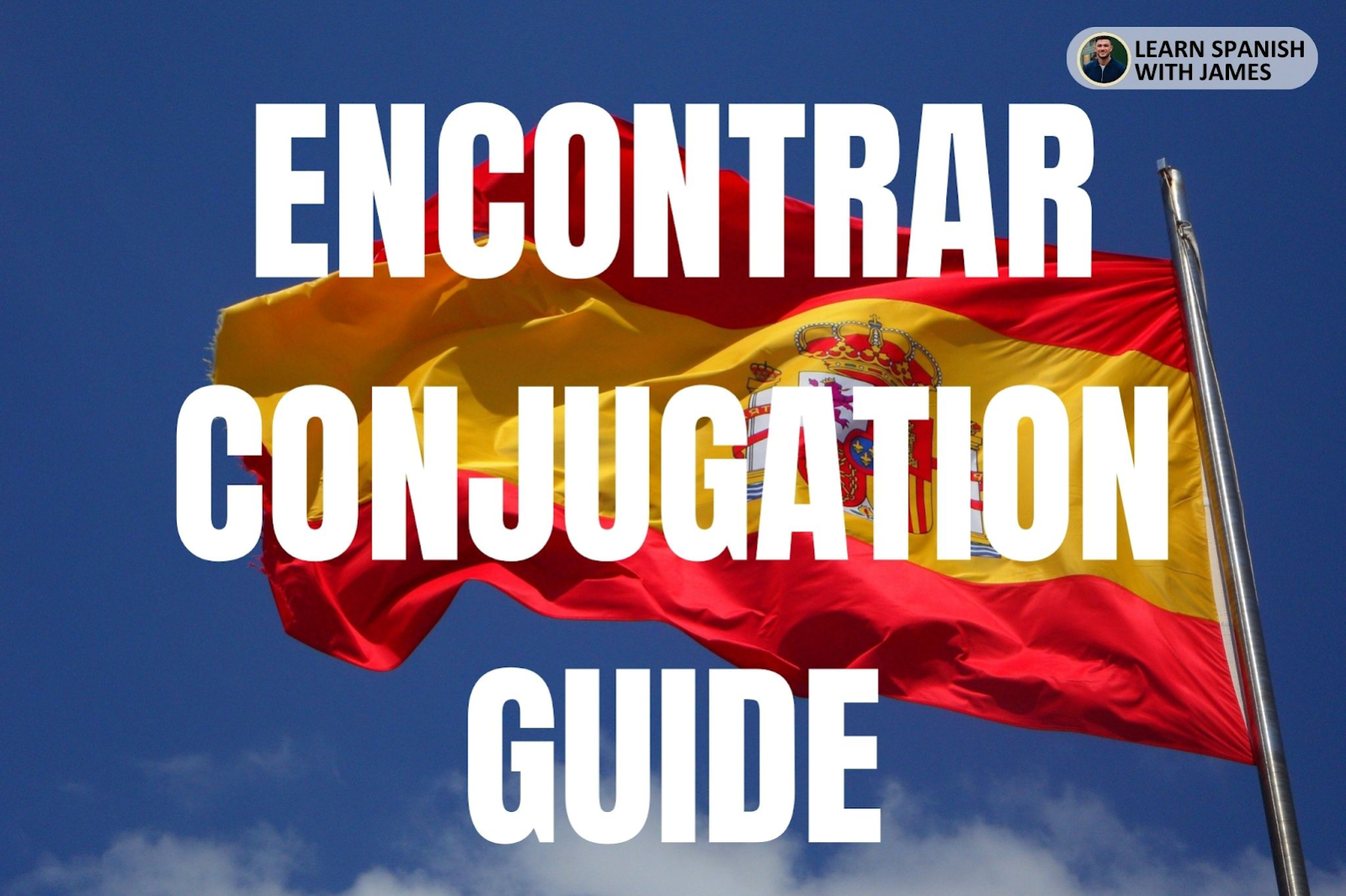Encontrar Conjugation Chart & Full Tense Guide

“Encontrar” is a Spanish irregular verb meaning “to find” and “to meet”. It is an essential verb to learn due to its versatility.
I’m James, from Learn Spanish With James and in this comprehensive guide, I’ll show you how to conjugate “encontrar”.
I’ve put together “encontrar” conjugation charts and example sentences with their English translations.
You’ll find a section for “encontrar” in every tense, covering all pronouns, moods and tenses.
My aim is to help you conjugate this verb, and all Spanish verbs with ease.
Present Tense
Pronouns Pronombres
I yo encuentro
you tú encuentras
he,she,it, you(formal) él,ella,usted encuentra
we nosotros,nosotras encontramos
you pl. vosotros, vosotras encontráis
they, you pl. (formal) ellos,ellas,ustedes encuentran
When We Use the Present Tense
The present tense is used to describe actions that are happening right now, habitual actions, or general truths.
When we want to conjugate regular -AR verbs (like trabajar) in the present tense, we remove the infinitive ending (-ar, -er, or -ir) and add the appropriate ending for each subject pronoun.
However, “encontrar” is not a regular verb in the present tense. It’s what we call a stem-changing verb.
Examples of “encontrar” in the present tense are available in the verb table above, and the example sentences below.
Examples of the Spanish Verb “Encontrar” in the Present Tense
- Yo encuentro el libro. (I find the book.)
- Tú encuentras la llave. (You find the key.)
- Él/Ella encuentra su destino. (He/She finds his/her destiny.)
- Nosotros encontramos el camino. (We find the way.)
- Vosotros encontráis la solución. (You all find the solution.)
- Ellos/Ellas encuentran la salida. (They find the exit.)
Preterite Tense
Pronouns Pronombres
I yo encontré
you tú encontraste
he, she. it, you (formal) él, ella, usted encontró
we nosotros, nosotras encontramos
you (plural) vosotros, vosotras encontrasteis
they, you (pl. formal) ellos, ellas, ustedes encontraron
When We Use the Preterite Tense
The preterite tense of any Spanish verb is used to describe actions that were completed at a specific point in the past.
The literal translation of “encontrar” when conjugated in the preterite tense is “found” or “met”.
The Spanish verb “encontrar” is regular in the preterite tense. So, if you have already learned other -AR verbs in the preterite tense, then learning these endings won’t be too tricky for you.
Top Tip: 🔥 Do not confuse the preterite tense with the imperfect tense. You’ll notice that “met” in the preterite differs from “used to meet” and “was meeting”, which are both examples of the imperfect tense.
Examples of “Encontrar” in the Preterite tense:
- Yo encontré mi teléfono perdido. (I found my lost phone.)
- Tú encontraste la respuesta correcta. (You found the correct answer.)
- Él/Ella encontró la solución al problema. (He/She found the solution to the problem.)
- Nosotros encontramos un tesoro enterrado. (We found a buried treasure.)
- Vosotros encontrasteis un lugar seguro para la víctima. (You all found a safe place for the victim.)
- Ellos/Ellas encontraron un nuevo hogar. (They found a new home.)
Imperfect Tense
Pronouns Pronombres
I yo encontraba
you tú encontrabas
he, she, it, you (formal) él, ella, usted encontraba
we nosotros, nosotras encontrábamos
you (plural) vosotros, vosotras encontrabais
they, you(pl. formal) ellos, ellas, ustedes encontraban
When We Use the Imperfect Tense
The imperfect tense in Spanish is used to describe ongoing or repeated actions in the past, as well as to provide background information or set the scene.
For this reason, I always make a point of saying in my study guides that the best way to learn the imperfect tense is to read Spanish literature.
Just like any Spanish verb in the imperfect tense, in order to conjugate “encontrar” you need to follow specific -AR verb conjugations.
You will find these below.
Top Tip: 🔥 When I started learning Spanish 15 years ago, this tense reminded me of the famous pop group ABBA, due to its pronunciation. So, when I wanted to use this tense, I always thought of the phrase “I used to love ABBA”. This “used to love” is an example of the imperfect tense!
Examples of “Encontrar” in the Imperfect Tense
- Yo encontraba tranquilidad en aquel lugar. (I used to find tranquility in that place.)
- Tú encontrabas tu camino en la oscuridad. (You found your way in the darkness.)
- Él/Ella encontraba consuelo en la música. (He/She found comfort in music.)
- Nosotros encontrábamos belleza en las pequeñas cosas. (We found beauty in the little things.)
- Vosotros encontrabais diversión en los juegos. (You all found fun in games.)
- Ellos/Ellas encontraban paz en la naturaleza. (They found peace in nature.)
Future Tense
Pronouns Pronombres
I yo encontraré
you tú encontrarás
he,she,it, you(formal) él,ella,usted encontrará
we nosotros,nosotras encontraremos
you pl. vosotros, vosotras encontraréis
they, you pl. (formal) ellos,ellas,ustedes encontrarán
When We Use the Future Tense
The future tense in Spanish is used to describe actions that will occur in the future.
Even though “encontrar” is an irregular verb in the present tense, it follows regular -AR verb endings in the future tense.
In fact, the future tense should be one of the easiest tenses for you to learn.
The literal translation is “will meet” or “will find”, as you will see in the example sentences below.
Examples of the Spanish Verb “Encontrar” in the Future Tense
- Yo encontraré la respuesta pronto. (I will find the answer soon.)
- Tú encontrarás la salida más tarde. (You will find the exit later.)
- Él/Ella encontrará su propósito en la vida. (He/She will find his/her purpose in life.)
- Nosotros encontraremos una solución juntos. (We will find a solution together.)
- Vosotros encontraréis la verdad al final. (You all will find the truth in the end.)
- Ellos/Ellas encontrarán la felicidad en el viaje. (They will find happiness in the journey.)
Conditional Tense
Pronouns Pronombres
I yo encontraría
you tú encontrarías
he,she,it, you(formal) él,ella,usted encontraría
we nosotros,nosotras encontraríamos
you pl. vosotros, vosotras encontraríais
they, you pl. (formal) ellos,ellas,ustedes encontrarían
When We Use the Conditional
The conditional tense in Spanish is used to express hypothetical situations or to convey what would happen under certain circumstances.
The conditional tense is seriously easy to learn. In fact, if you are a beginner, you should make this the next tense you learn after the present tense.
In order to form the conditional tense, just add the specific endings you see in the conjugation chart to the infinitive of the verb.
Top Tip: 🔥 If you want to score big in your Spanish speaking exam, learn to use this tense with the imperfect subjunctive in the same sentence. Doing so is a great way to incorporate high level sentence structure into your oral exam.
Examples of “Encontrar” in the Conditional
- Yo encontraría la solución si pudiera. (I would find the solution if I could.)
- Tú encontrarías más respuestas si buscaras. (You would find more answers if you searched.)
- Él/Ella encontraría la paz en otro lugar. (He/She would find peace elsewhere.)
- Nosotros encontraríamos una salida si fuéramos juntos. (We would find a way out if we went together.)
- Vosotros encontraríais más oportunidades si lo intentarais. (You all would find more opportunities if you tried.)
- Ellos/Ellas encontrarían consuelo en la música. (They would find comfort in music.)
Perfect Tense
Pronouns Pronombres Auxiliary verb ‘haber’
I yo he encontrado
you tú has encontrado
he,she,it, you(formal) él,ella,usted ha encontrado
we nosotros,nosotras hemos encontrado
you pl. vosotros, vosotras habéis encontrado
they, you pl. (formal) ellos,ellas,ustedes han encontrado
When We Use the Perfect Tense
We use the perfect tense in Spanish to describe actions that were completed in the past but have relevance or impact on the present.
The perfect tense in Spanish is the first past tense we will cover which requires you to conjugate the auxilary verb “haber” (to have) and use the past participle of “encontrar”.
This becomes “encontrado”. This pattern is the same for every -AR verb in Spanish. To practice, see the following:
– “Dejar” Conjugation Guide – (becomes “dejado“)
– “Hablar” Conjugation Guide – (becomes “hablado“)
– “Llevar” Conjugation Guide – (becomes “llevado“)
– “Dar” Conjugation Guide – (becomes “dado“)
– “Pasar” Conjugation Guide – (becomes “pasado“)
You should now be seeing the past participle pattern for -AR verbs.
Top Tip: 🔥 Do not confuse “haber” with “tener”. The latter is used for anything tangible, something you have to do, or something you can hold in your possession. The former is an auxilary verb, meaning we use it solely to form a sentence.
Examples of “Encontrar” in the Preterite Perfect Tense
- Yo he encontrado lo que buscaba. (I have found what I was looking for.)
- Tú has encontrado la verdad oculta. (You have found the hidden truth.)
- Él/Ella ha encontrado su lugar en el mundo. (He/She has found his/her place in the world.)
- Nosotros hemos encontrado nuevas oportunidades. (We have found new opportunities.)
- Vosotros habéis encontrado vuestro camino. (You all have found your path.)
- Ellos/Ellas han encontrado la fuerza para seguir adelante. (They have found the strength to move forward.)
Pluperfect Tense
Pronouns Pronombres Auxiliary verb ‘haber’
I yo había encontrado
you tú habías encontrado
he,she,it, you(formal) él,ella,usted había encontrado
we nosotros,nosotras habíamos encontrado
you pl. vosotros, vosotras habíais encontrado
they, you pl. (formal) ellos,ellas,ustedes habían encontrado
When We Use the Pluperfect Tense
The pluperfect tense in Spanish is used to describe actions that had occurred before another past action or point in time.
We formed the pluperfect tense by with the auxiliary verb “haber” followed by the past participle of the main verb, in this case “encontrar”.
As we know, this becomes “encontrado”.
Examples of “Encontrar” in the Pluperfect Tense
- Yo había encontrado la llave perdida antes de salir. (I had found the lost key before leaving.)
- Tú habías encontrado la solución al problema. (You had found the solution to the problem.)
- Él/Ella había encontrado la inspiración para escribir. (He/She had found the inspiration to write.)
- Nosotros habíamos encontrado la respuesta correcta. (We had found the correct answer.)
- Vosotros habíais encontrado vuestro destino. (You all had found your destiny.)
- Ellos/Ellas habían encontrado la paz que buscaban. (They had found the peace they were looking for.)
Future Perfect Tense
Pronouns Pronombres Auxiliary verb ‘haber’
I yo habré encontrado
you tú habrás encontrado
he,she,it, you(formal) él,ella,usted habrá encontrado
we nosotros,nosotras habremos encontrado
you pl. vosotros, vosotras habréis encontrado
they, you pl. (formal) ellos,ellas,ustedes habrán encontrado
When We Use the Future Perfect Tense
The future perfect tense in Spanish allows us to describe actions that will have been completed by a certain point in the future.
Again, you will notice that we need to conjugate “haber” in order to form this tense, and follow it with “encontrado”.
Check out the “encontrar” conjugation chart above to learn these endings, and the sentences below to learn how to use the future perfect tense in context.
Examples of Future Perfect Tense “Encontrar” Conjugation
- Yo habré encontrado la solución para entonces. (I will have found the solution by then.)
- Tú habrás encontrado nuevas oportunidades. (You will have found new opportunities.)
- Él/Ella habrá encontrado su lugar en el mundo. (He/She will have found his/her place in the world.)
- Nosotros habremos encontrado la salida. (We will have found the way out.)
- Vosotros habréis encontrado la verdad. (You all will have found the truth.)
- Ellos/Ellas habrán encontrado la felicidad que buscaban. (They will have found the happiness they were looking for.)
Conditional Perfect Tense
Pronouns Pronombres Auxiliary verb ‘haber’
I yo habría encontrado
you tú habrías encontrado
he,she,it, you(formal) él,ella,usted habría encontrado
we nosotros,nosotras habríamos encontrado
you pl. vosotros, vosotras habríais encontrado
they, you pl. (formal) ellos,ellas,ustedes habrían encontrado
When We Use the Conditional Perfect
The conditional perfect tense in Spanish is used to express hypothetical actions that would have been completed under certain conditions.
You get the idea by now. We need to form the conditional tense of the auxiliary verb “haber” followed by the past participle of the main verb.
Do not confuse this tense with the future perfect tense. Just like the conditional tense, the conditional perfect is “would”, whereas the future and future perfect tenses are “will”.
These differences may seem minor, but they can completely alter the meaning of a sentence.
Examples of the Conditional Perfect “Encontrar” Conjugation
- Yo habría encontrado la solución si hubiera buscado más. (I would have found the solution if I had searched more.)
- Tú habrías encontrado la respuesta si hubieras preguntado. (You would have found the answer if you had asked.)
- Él/Ella habría encontrado consuelo si hubiera estado con amigos. (He/She would have found comfort if he/she had been with friends.)
- Nosotros habríamos encontrado una salida si hubiéramos llegado antes. (We would have found a way out if we had arrived earlier.)
- Vosotros habríais encontrado la verdad si hubierais indagado más. (You all would have found the truth if you had investigated more.)
- Ellos/Ellas habrían encontrado la solución si hubieran trabajado juntos. (They would have found the solution if they had worked together.)
Present Subjunctive
Pronouns Pronombres
I yo encuentre
you tú encuentres
he,she,it, you(formal) él,ella,usted encuentre
we nosotros,nosotras encontremos
you pl. vosotros, vosotras encontréis
they, you pl. (formal) ellos,ellas,ustedes encuentren
When We Use the Present Subjunctive
The present subjunctive mood in Spanish is used to express desires, doubts, wishes, or uncertainty.
It is often used in dependent clauses following certain expressions or verbs.
You will notice that the irregular Spanish verb “encontrar” has been regular in many of the conjugation charts provided so far.
However, it becomes irregular again in the subjunctive form.
In order to learn these “encontrar” conjugations, you should refer to the stem-changing present tense first, then come back to this section.
Examples of the Present Subjunctive “Encontrar” Conjugation
- Yo espero que encuentre la solución pronto. (I hope that I find the solution soon.)
- Tú deseas que encuentres la llave perdida. (You wish to find the lost key.)
- Él/Ella espera que encuentre la respuesta correcta. (He/She hopes to find the correct answer.)
- Nosotros queremos que encontremos una salida segura. (We want to find a safe way out.)
- Vosotros preferís que encontréis la paz interior. (You all prefer to find inner peace.)
- Ellos/Ellas desean que encuentren la felicidad en sus vidas. (They wish to find happiness in their lives.)
Imperfect Subjunctive
Pronouns Pronombres
I yo encontrara, encontrase
you tú encontraras, encontrases
he,she,it, you(formal) él,ella,usted encontrara, encontrase
we nosotros,nosotras encontráramos, encontrásemos
you pl. vosotros, vosotras encontrarais, encontraseis
they, you pl. (formal) ellos,ellas,ustedes encontraran, encontrasen
When We Use the Imperfect Subjunctive
The imperfect subjunctive in Spanish is used to express hypothetical situations, doubts, desires, or wishes in the past.
It is often used in dependent clauses following certain expressions or verbs.
If you want to achieve top marks in your speaking and writing exams, you will need to use the imperfect subjunctive with the conditional tense in the same sentence.
Examples of the Imperfect Subjunctive “Encontrar” Conjugation
- Esperaba que encontrara la respuesta pronto. (I hoped I would find the answer soon.)
- Quería que encontraras tu camino en la vida. (I wanted you to find your path in life.)
- Dudaba que encontrara una solución fácilmente en el sistema operativo. (I doubted he/she would find a solution easily.)
- Ojalá que encontráramos la paz que buscábamos. (I hoped we would find the peace we were looking for.)
- Era importante que encontraran una solución juntos. (It was important that they found a solution together.)
- Prefería que encontrárais una salida segura. (I preferred you all found a safe way out.)
Affirmative Imperative
Pronouns Pronombres
you tú ¡encuentra!
he,she,it, you(formal) él,ella,usted ¡encuentre!
we nosotros,nosotras ¡encontremos!
you pl. vosotros, vosotras ¡encontrad!
they, you pl. (formal) ellos,ellas,ustedes ¡encuentren!
When We Use The Affirmative Imperative
The affirmative imperative form of a Spanish verb is used to give direct commands or orders in a positive manner. It is used to instruct someone to perform an action.
The imperative conjugation varies depending on the subject pronoun and the infinitive form.
In this case, it would be “find” or “meet” when telling someone to do either of these things.
We can also use this as a way to say “let’s” do something.
Examples of The Affirmative Imperative “Encontrar” Conjugation
- Encuentra el tesoro. (Find the treasure.)
- Encuentre la salida. (Find the exit.)
- Encontremos la solución juntos. (Let’s find the solution together.)
- Encontrad la respuesta correcta. (Find the correct answer.)
- Encuentren la llave perdida. (Find the lost key.)
Negative Imperative
Pronouns Pronombres
you tú ¡no encuentres!
he,she,it, you(formal) él,ella,usted ¡no encuentre!
we nosotros,nosotras ¡no encontremos!
you pl. vosotros, vosotras ¡no encontréis!
they, you pl. (formal) ellos,ellas,ustedes ¡no encuentren!
When We Use The Negative Imperative
The negative imperative in Spanish is used to give commands or orders in a negative manner, instructing someone not to perform an action.
It is formed by using the word “no” before the verb in its affirmative imperative form.
Just as we can use the affirmative imperative as a way to say “let’s” do something, the negative imperative tells someone or a group of people not to do something.
Examples of The Negative Imperative “Encontrar” Conjugation
- No encuentres el camino peligroso. (Don’t find the dangerous path.)
- No encuentre la respuesta en Internet. (Don’t find the answer on the internet.)
- No encontremos excusas para no hacerlo. (Let’s not find excuses not to do it.)
- No encontréis problemas donde no los hay. (Don’t find problems where there are none.)
- No encuentren errores en el trabajo de los demás. (Don’t find errors in others’ work.)
Online Spanish Courses & Grammar Courses
I hope you found this “encontrar” conjugation guide helpful.
For a full list of Beginner, Intermediate and Advanced Courses, check out this full list of online Spanish courses.
I put this list together myself, and it comprises a mixture of courses that offer Spanish grammar practice for all levels, conversational practice, listening and writing exercises in Spanish, free Spanish courses, and a whole lot more.
The fastest way to learn Spanish is to test a mixture of Spanish resources and choose the course that coincides most with your learning style.
In addition to online Spanish courses, on this site you will find a wide range of Spanish podcasts, Spanish apps, Spanish YouTube channels, and both online and physical Spanish language schools.

About James – Or Should that be Santiago?
My name is James. I am a Brit with a love for the Spanish language. I have lived in Spain, Argentina, and Costa Rica, and I have been teaching Spanish for over a decade. This site will show you how to master the elements of Spanish grammar that often dishearten learners. I hope you enjoy the site and find it useful.
If you are interested in taking your Spanish to the next level, check out the Courses section for a full list of the Spanish courses I suggest. All reviews are based on my personal opinions.





